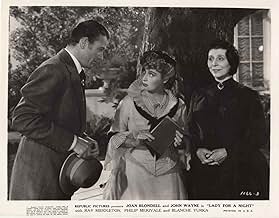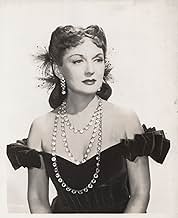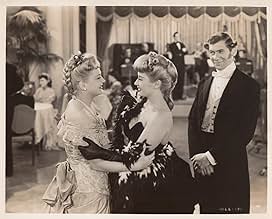AVALIAÇÃO DA IMDb
6,0/10
672
SUA AVALIAÇÃO
Adicionar um enredo no seu idiomaGambling boat operator Jenny Blake throws over her gambler beau Jack Morgan in order to marry into high society.Gambling boat operator Jenny Blake throws over her gambler beau Jack Morgan in order to marry into high society.Gambling boat operator Jenny Blake throws over her gambler beau Jack Morgan in order to marry into high society.
- Direção
- Roteiristas
- Artistas
Hall Johnson Choir
- Singers
- (as The Hall Johnson Choir)
Fred Aldrich
- Member of Quartet
- (não creditado)
- Direção
- Roteiristas
- Elenco e equipe completos
- Produção, bilheteria e muito mais no IMDbPro
Avaliações em destaque
While I like both Joan Blondell and John Wayne, that wasn't enough for me to give this movie a higher rating. The costumes were gorgeous, and I loved the settings (the late 1860's had a certain visual charm), but the story left a lot to be desired.
The premise was good: casino owner Jenny Blake (Joan) wants to escape her lower class background and gain respectability, so she forsakes her boyfriend, Jack Morgan (John) and marries into the socially prominent but financially deficient Alderson family, trading her money for Alan Alderson's name and social connections. She soon finds out she didn't get the best of the bargain, as Alan's an alcoholic, and his family consists of his snobbish, angry father, his sour faced, domineering Aunt Julia, and his mentally vague (though kindly) Aunt Katherine. Jenny's not welcomed, made to feel like an outcast, and kept away from the very people she wanted to impress. She also senses there's more going on in this peculiar family than anyone will admit, though she gets some cryptic hints from Katherine.
Where the movie fails, is in its inability to make up its mind whether to be a musical (there are several numbers performed on the riverboat casino and at the Alderson mansion), a romance, a mystery or a gothic horror story. By trying to be a little of each, it accomplished even less. I guess you could call this a jack-of-all-trades-master-of-none movie.
It has its saving graces. The musical numbers were good, and there was an exciting chase scene, as Jack races to save Jenny, when she loses control of her carriage, unaware of the horses's impaired vision. There were a couple of black servants (Hattie Noel and Lew Payton) who gave the story some comic moments.
Not a bad movie, but it could have been better.
The premise was good: casino owner Jenny Blake (Joan) wants to escape her lower class background and gain respectability, so she forsakes her boyfriend, Jack Morgan (John) and marries into the socially prominent but financially deficient Alderson family, trading her money for Alan Alderson's name and social connections. She soon finds out she didn't get the best of the bargain, as Alan's an alcoholic, and his family consists of his snobbish, angry father, his sour faced, domineering Aunt Julia, and his mentally vague (though kindly) Aunt Katherine. Jenny's not welcomed, made to feel like an outcast, and kept away from the very people she wanted to impress. She also senses there's more going on in this peculiar family than anyone will admit, though she gets some cryptic hints from Katherine.
Where the movie fails, is in its inability to make up its mind whether to be a musical (there are several numbers performed on the riverboat casino and at the Alderson mansion), a romance, a mystery or a gothic horror story. By trying to be a little of each, it accomplished even less. I guess you could call this a jack-of-all-trades-master-of-none movie.
It has its saving graces. The musical numbers were good, and there was an exciting chase scene, as Jack races to save Jenny, when she loses control of her carriage, unaware of the horses's impaired vision. There were a couple of black servants (Hattie Noel and Lew Payton) who gave the story some comic moments.
Not a bad movie, but it could have been better.
Jenny Blake is the owner of a river boat for gambling, dancing, drinking and women suffice to say that she is not really accepted into polite society in the way she always dreamed of being. So when she is voted the Queen of the Mardi Gras, Jenny is overjoyed, only to be upset when she learns that her business partner Jack Morgan helped her by rigging the whole contest. So whenever drunken plantation owner Alan Alderson gets into serious debt with the gambling boat Jenny proposes to wipe out the debts in return for his hand in marriage and the fast track into high class society. However, not all those in that circle are that happy with her sudden rise above her station, especially Aunt Julia who is determined to get rid of her by any means necessary.
I cannot remember why I decided to tape this film and, now that I've watched it I still have no idea although I'm sure it was down to some sort of obsessive compulsion than any great attraction of the film! Anyway, the plot is a simple one of social climbing where Jenny tries to get away from her own level only to find that those above her don't want her to climb. You pretty much know where it is going from the first 20 minutes, although the plot still manages to be unlikely as well as predictable. It is nothing special but it isn't awful or annoying it is just rather bland. The drama side is plodding and obvious, while the comedy is laugh free and relies more on energy than anything else. The couple of songs act well as distraction and filler but they are only OK. These produce a film that just looks to keep you happy for about 90 minutes but not do anything special during that time or have any impact past the end credits.
The characters are very simply painted in the script and are simply delivered by the cast. Blondell is OK but she is hardly 'trash' is she and we never doubt what will happen to her ideals by the end. Wayne is a secondary character who's only purpose is to be a decent man who turns up every 10 minutes to help Blondell in some way. The support cast of Aldersons are very much join the dots and the actors are only average. There are a large amount of black characters, with two main ones in comedy roles modern audiences may find them hard to watch because they are ethnic stereotypes that are overplayed for comedic effect. At first I was a bit taken aback by this (although I know it is of its time) but then I thought about modern movies that do the same thing (albeit with a cooler, hip hop, ebonics stereotype) and wondering if, in 50 years, that these films would be viewed as rather racist. Anyway, it was interesting to see the stereotypes but I must admit to have been a bit caught off guard when John Wayne threatened to send Hattie Noel 'back to Africa'!
Overall this is an instantly forgettable movie that only wants to keep you semi-entertained for the running time without doing anything special or making a lasting impression. Maybe it is the presence of John Wayne that has meant it still pops up on television with some regularity because other than that I really have no clue as to why it has not been just forgotten by time.
I cannot remember why I decided to tape this film and, now that I've watched it I still have no idea although I'm sure it was down to some sort of obsessive compulsion than any great attraction of the film! Anyway, the plot is a simple one of social climbing where Jenny tries to get away from her own level only to find that those above her don't want her to climb. You pretty much know where it is going from the first 20 minutes, although the plot still manages to be unlikely as well as predictable. It is nothing special but it isn't awful or annoying it is just rather bland. The drama side is plodding and obvious, while the comedy is laugh free and relies more on energy than anything else. The couple of songs act well as distraction and filler but they are only OK. These produce a film that just looks to keep you happy for about 90 minutes but not do anything special during that time or have any impact past the end credits.
The characters are very simply painted in the script and are simply delivered by the cast. Blondell is OK but she is hardly 'trash' is she and we never doubt what will happen to her ideals by the end. Wayne is a secondary character who's only purpose is to be a decent man who turns up every 10 minutes to help Blondell in some way. The support cast of Aldersons are very much join the dots and the actors are only average. There are a large amount of black characters, with two main ones in comedy roles modern audiences may find them hard to watch because they are ethnic stereotypes that are overplayed for comedic effect. At first I was a bit taken aback by this (although I know it is of its time) but then I thought about modern movies that do the same thing (albeit with a cooler, hip hop, ebonics stereotype) and wondering if, in 50 years, that these films would be viewed as rather racist. Anyway, it was interesting to see the stereotypes but I must admit to have been a bit caught off guard when John Wayne threatened to send Hattie Noel 'back to Africa'!
Overall this is an instantly forgettable movie that only wants to keep you semi-entertained for the running time without doing anything special or making a lasting impression. Maybe it is the presence of John Wayne that has meant it still pops up on television with some regularity because other than that I really have no clue as to why it has not been just forgotten by time.
Joan Blondell delivers something of a feisty Stanwyck-style character in her depiction of successful river boat owner "Jenny". Together with her local kingpin co-partner "Jackson" (John Wayne) they make a good living from the great and the good of Tennessee society. The thing is, though, "Jenny" has ambitions to join that society. She craves respectability and when an opportunity to marry into the "Alderson" family presents itself, she doesn't think twice. Her new husband "Alan" (Ray Middleton) is a bit of a drunk, but his family need her money so unwillingly tolerate her. All except, "Julia" (Blanche Yurka) who really does look down her nose at her new in-law. The more "Jenny" tries, the more cleverly antagonistic her nemesis becomes until finally murder ensues and the truth must out... It's a bit of an amalgam of stories this, and the really rather wooden Wayne features too sparingly to make much difference to the rather meandering drama. Hattie Noel has some fun as "Chloe" and there's a bit of toe-tapping mid way through but the rest of this is all just a little procedural with an expected twist right at the denouement. It's a good looking tale of rancour, envy, love and bitterness - but told in fashion you're not really likely to remember.
The prior review was excellent. But the movie is set in Memphis not New Orleans, even though the Mardi Gras opening would belie that. And Joan Blondell's character is the one who proposes the marriage, not the other way around. All in all, it's very entertaining movie which deserves a better reputation.
First off, anyone who watches this film because it's a John Wayne film (like me) may be disappointed because he is really a supporting actor. This is because he'd only been a regular starring actor in small-budget B-Westerns and in larger budget films he was mostly in secondary roles until the mid-to-late 1940s. Second, because the Wayne screen persona was not yet solidified, lovers of the Duke might also be shocked to see that for most of the film he plays a love-sick man who loses his woman to another. Had the later Wayne been in such a situation, he no doubt would have slugged the other suitor and drug off the woman for some lovin'--John Wayne style!! The real star of this film is Joan Blondell. Unlike Wayne, her star was starting to fall, as her prime as a leading lady was definitely the 1930s. Here she is a bit older and heavier, but this is also perfect for her role as a casino owner and singer.
Blondell's ambition is to leave the casino life to Wayne and marry a society man in order to ensure herself a play in polite society. Unfortunately, she's seen as a woman of low virtue and the only man she can find to marry is a drunk from a previously wealthy and well-heeled family.
Her welcome into the new family was not surprisingly rocky, as one of her new sister-in-laws was just plain evil. The longer the film progresses, the more evil and juicy this role becomes--making this a pretty exciting film and characterization. Ultimately, the plot takes a very dramatic twist near the end until it is all wrapped up nicely in the end.
The only serious negative about the film is that the plantation she moves to in Reconstruction-era Memphis is ridiculous and full of racist stereotypes. No, the Blacks do not eat watermelon or act as bad as Stepin Fetchit, but they play out an even more insidious role--happy Blacks who are content with the good treatment by their White "betters". This over-idealistic view of the South is insulting and may raise a few eyebrows. Try to look past this to see that you still have the basis of a very good film.
Blondell's ambition is to leave the casino life to Wayne and marry a society man in order to ensure herself a play in polite society. Unfortunately, she's seen as a woman of low virtue and the only man she can find to marry is a drunk from a previously wealthy and well-heeled family.
Her welcome into the new family was not surprisingly rocky, as one of her new sister-in-laws was just plain evil. The longer the film progresses, the more evil and juicy this role becomes--making this a pretty exciting film and characterization. Ultimately, the plot takes a very dramatic twist near the end until it is all wrapped up nicely in the end.
The only serious negative about the film is that the plantation she moves to in Reconstruction-era Memphis is ridiculous and full of racist stereotypes. No, the Blacks do not eat watermelon or act as bad as Stepin Fetchit, but they play out an even more insidious role--happy Blacks who are content with the good treatment by their White "betters". This over-idealistic view of the South is insulting and may raise a few eyebrows. Try to look past this to see that you still have the basis of a very good film.
Você sabia?
- CuriosidadesThis film inspired the name of one of the most famous World War 2 bombers, the B-17 "Memphis Belle", one of the first to complete a full combat tour of 25 missions against targets in Nazi Germany in May 1943. The aircraft was the namesake of pilot Captain Robert K. Morgan's sweetheart, Margaret Polk, a resident of Memphis, Tennessee. Morgan originally intended to call the B-17, Little One, after his pet name for her, but after Morgan and his co-pilot, Jim Verinis, saw this movie in which the leading character owns a riverboat named the Memphis Belle, he proposed that name to his crew. After their combat service, the Belle and her crew were sent home on highly successful war bond tour. They were also featured in an award-winning 1944 documentary by William Wyler.
- Cenas durante ou pós-créditosUnderneath the credits, there is some footage of extras dancing in front of the Alderson family's house.
- Trilhas sonorasUp in a Balloon
(uncredited)
Written by Henry B. Farnie (1868)
Special Lyrics by Sol Meyer
Sung by Joan Blondell, a quartet and chorus on the Memphis Belle
Whistled by John Wayne
Played as backgroung music often
Principais escolhas
Faça login para avaliar e ver a lista de recomendações personalizadas
- How long is Lady for a Night?Fornecido pela Alexa
Detalhes
- Data de lançamento
- País de origem
- Idioma
- Também conhecido como
- Lady for a Night
- Locações de filme
- Empresa de produção
- Consulte mais créditos da empresa na IMDbPro
- Tempo de duração1 hora 27 minutos
- Cor
- Proporção
- 1.37 : 1
Contribua para esta página
Sugerir uma alteração ou adicionar conteúdo ausente

Principal brecha
By what name was Dama por uma Noite (1942) officially released in India in English?
Responda



































